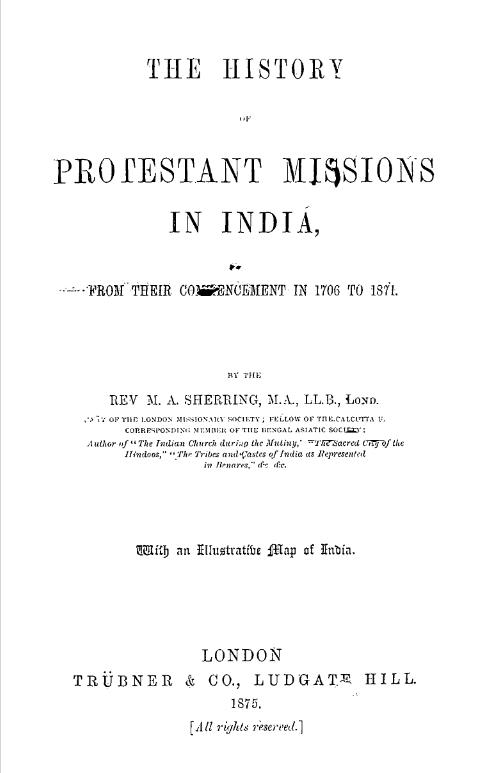The history of Protestant missions in India is a narrative of faith, sacrifice, and perseverance. Beginning in the early 19th century, the Protestant mission movement sought to spread Christianity and promote social reforms in the nation. One of the notable works documenting this movement is “The History of Protestant Missions in India,” authored by M.A. Serring, which was published in 1875. This essay aims to encapsulate the core themes and historical insights presented by Serring and highlight the contributions and challenges faced by Protestant missionaries in India.
The inception of Protestant missions in India can be traced back to the British colonial era when various missionary societies began to take root. The Church Missionary Society (CMS), founded in 1799, stands out as one of the first organizations dedicated to the missionary cause in India. Serring details how the initial efforts were often met with skepticism and resistance, both from the local population and other religious groups. The missionaries, motivated by a deep sense of duty and religious fervor, set out to establish schools, hospitals, and churches to serve the community.
One of Serring’s prominent themes is the socio-cultural impact of Protestant missions on Indian society. The missionaries not only aimed to convert individuals to Christianity but also to uplift the marginalized sections of society. Their efforts in education transformed the landscape of knowledge, particularly for women and the lower castes, who had previously been denied access to formal education. The establishment of schools, such as those run by the American and British Board of Commissioners for Foreign Missions, played a crucial role in spreading literacy and enlightenment among the masses. Serring emphasizes that these educational institutions were instrumental in challenging societal norms and promoting a sense of individual dignity.
Despite their noble intentions, Protestant missionaries encountered significant challenges. There was widespread distrust toward foreign missionaries, often fueled by political tensions and the socio-religious environment of India. Serring recounts various incidents of hostility towards missionaries, including vandalism of mission properties and violent opposition from traditionalists who perceived the missionaries as a threat to their cultural and religious heritage. The missionaries had to navigate a complex web of politics, cultural sensitivities, and local customs while remaining resolute in their mission.
Serring also highlights notable figures in the Protestant mission movement, such as William Carey, who is often referred to as the father of modern missions. Carey’s translation of the Bible into various Indian languages and his advocacy for education and social reforms left an indelible mark on the Indian landscape. Missionaries like Carey not only advanced the cause of Christianity but actively participated in social reform movements, advocating against practices like sati (the burning of widows) and promoting the rights of women and the downtrodden.
Books Info
| Books name | History of Protestant Missions in India,The |
| Author | MA Serring |
| No Of pages | 438 |
| Publisher | NA |
| Publication | 1875 |
| Printed At | NA |
| Distributor | NA |
History of Protestant Missions in India,The Sample
History of Protestant Missions in India,The Full Phd Download

